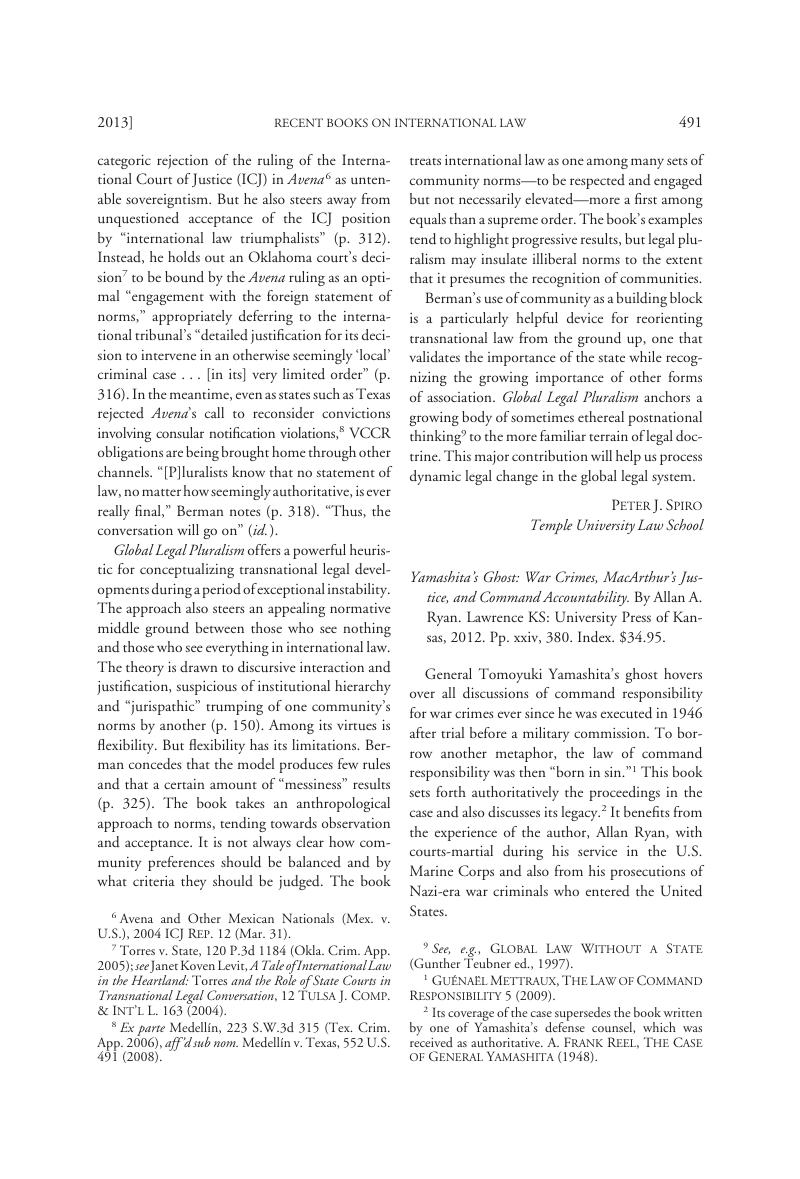No CrossRef data available.
Article contents
Yamashita’s Ghost: War Crimes, MacArthur’s Justice, and Command Accountability. By Allan A. Ryan. Lawrence KS: University Press of Kansas, 2012. Pp. xxiv, 380. Index. $34.95.
Published online by Cambridge University Press: 20 January 2017
Abstract

- Type
- Recent Books on International Law
- Information
- Copyright
- Copyright © American Society of International Law 2013
References
1 Guánaël Mettraux The Law of Command Responsibility 5 (2009).
2 Its coverage of the case supersedes the book written by one of Yamashita’s defense counsel, which was received as authoritative. A. Frank Reel, The Case of General Yamashita (1948).
3 E.g., Peter Judson Richards, Extraordinary Justice: Military Tribunals in Historical and International Context 126–27 (2007) (and sources cited therein).
4 The most forceful defense of the proceedings is Parks, William H., Command Responsibility for War Crimes, 62 MIL. L. Rev. 1, 22–35 (1973)Google Scholar.
5 The U.S. Supreme Court heard a number of cases from the Philippines (which was then under U.S. jurisdiction), including Strong v. Repide, 213 U.S. 419 (1909), which considered insider trading in securities.
6 In re Yamashita, 327 U.S. 1 (1946).
7 Id. at 15.
8 But see United States v.Park, 421 U.S. 658, 666 n.9 (1975) (ruling that the president of a food store company could be convicted of violating a statute on unsanitary foods if he had “a responsible relationship to the issue”).
9 “We, the victorious American forces, have done everything possible to destroy and disorganize your lines of communication, your effective control of your personnel, your ability to wage war.... In short we charge you with the crime of inefficiency in controlling your troops. We will judge the discharge of your duties by the disorganization which we ourselves created in large part. Our standards of judgment are whatever we wish to make them.” Yamashita, 327 U.S. at 34 (Murphy, J., dissenting).
10 Hamdan v. Rumsfeld, 548 U.S. 557, 603, 613 (2006).
11 Homma v. Patterson, 327 U.S. 759 (1946) (summarily dismissing the defendant’s petitions). Justices Murphy and Rutledge again dissented (and cited Yamashita).
12 Philip R. Piccigallo, The Japanese on Trial:Allied War Crimes Operations in the East, 1945–51 (1979).
13 Parks,supra note 4, at 64–73; Howards. Levie, Terrorism in War:The Law of War Crimes 425–27 (1993).
14 United States v. von Leeb (The High Command Case), 11 Trials of War Criminals Before the Nuremberg Military Tribunals Under Control Council Law No. 10, at 462 (1950) [herein after TRIALS].
15 United States v. List (The Hostage Case), 11 Trials, supra note 14, at 757.
16 References were made to Yamashita. see Parks, supra note 4, at 49–50, 56, 64.
17 By those tests, responsibility for the torture at Abu Ghraib could have been pursued to the Rumsfeld-Bush level of command.
18 See Mettraux, supra note 1, at 225, 245–46.
19 The relevant provisions are reprinted inid. at 273– 84.


